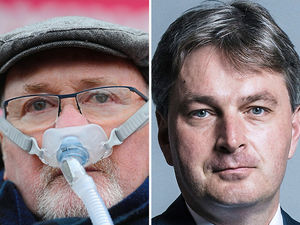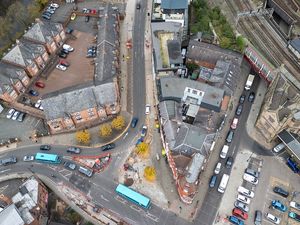'My most profound meeting as an MP': Daniel Kawczynski moved by Noel Conway campaign
Daniel Kawczynski’s Catholic views on assisted dying have been challenged “like never before” following his meeting with Noel Conway.

Mr Conway, who is suffering from motor neurone disease, is fighting a legal battle for the right to enlist help from medical professionals to bring about his death.
Mr Kawczynski, MP for Shrewsbury and Atcham, met with Mr Conway and his wife Carol at their home near Shrewsbury.
He said it was the most profound meeting in his 13 years as member of parliament.
And he admitted that he has had to rethink his views, which follow those of the Catholic Church, that life should be protected in any circumstance.
Mr Kawczynski visited Mr Conway at his home close to the Wrekin on Friday.
He said he believed it was important to hear for himself the reasons why Mr Conway wanted the power to determine when he dies.
The MP said: “He has been campaigning for a long time on assisted suicide and I wanted to go and see him myself to spend time with him to hear first-hand some of the difficulties he is facing and some of the problems his condition is posing to him and his family,” said .
“And I wanted to hear it first-hand why he believes there needs to be a change in the law and people should be able to terminate their lives when they feel appropriate under those circumstances.
“My views were challenged like never before because I’ve always been very much against assisted suicide.”
Mr Kawczynski said he has not decided how he would vote on assisted suicide in the House of Commons.
The 68-year-old retired lecturer wants to be helped to die – which the law currently prevents.
He says the law should be changed to allow the decision to be made when the individual involved has less than six months left to live, still has mental capacity to make the decision and has made a “voluntary, clear, settled and informed” decision.
He has proposed that he could only receive assistance to die if a High Court judge determined that he meets all three of those criteria.
Mr Conway previously asked the High Court for a declaration that the Suicide Act 1961 is incompatible with Article 8 of the European Convention on Human Rights, which relates to respect for private and family life, and Article 14, which protects from discrimination.
His case was rejected in October last year, but a full appeal against that ruling was heard last month.
Mr Conway was too unwell to travel to London for the hearing but watched proceedings over a video link from Telford County Court.
Mr Conway is being represented by law firm Irwin Mitchell and supported by the campaign group Dignity in Dying.
Outlining his case to three senior Appeal Court judges in May, Mr Conway’s lawyers said the law as it stands interferes with his rights and that the court had to decide whether that interference was “justified and proportionate”.
Nathalie Lieven QC said: “The question for this court is not a very generalised one of the morality or ethics of allowing doctors to assist patients to die.
“The question for this court is rather a focused one of whether for this very specific cohort, ie, terminally ill people with less than six months to live, the ban is justifiable because of an impact on the weak and vulnerable.”
The decision of the Appeal Court is expected to be released soon.
Any relaxation of laws on the right to die issue has been opposed by groups argue that life should be protected in any circumstance.
His appeal last month was opposed by the Secretary of State for Justice, with Humanists UK, Care Not Killing and Not Dead Yet UK also making submissions.




